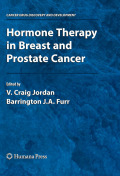
In Hormone Therapy in Breast and Prostate Cancer, many of today's leading researchers and clinicians describe the principles underlying targeted hormonal treatments, assess the actions of new and established agents, and illustrate the new applications of hormonal chemoprevention for breast cancer. Topics rangefrom preclinical and clinical antiestrogens to the inhibition of estrogen synthesis and the effects of androgen withdrawal. A wide variety of proven and new agents are discussed-antiestrogens, including aromatase inhibitors (anastrozole, letrozole, and others), SERMs (tamoxifen, raloxifene, and others), and such antiandrogenic strategies as goserelin and bicalutamide. INDICE: An Introduction to the Regulation of Sex Steroids for the Treatment of Cancer.- Part I. Preclinical Antiestrogens. Antiestrogens and the Cell Cycle. Drug Resistance to Antiestrogens. Mechanisms of Liver Carcinogenesis by Antiestrogens. The Effects of Triphenylethylene Antiestrogens on Parameters of Multistage Hepatocarcinogenesis in the Rat. Preclinical Studies of Raloxifene and Related Compounds.- Part II. Antiestrogens: Clinical Tamoxifen for the Treatment of Breast Cancer. Clinical Utility of New Antiestrogens. Breast Cancer Prevention with Antiestrogens.- Part III. Inhibition of Estrogen Synthesis. Aromatase Inhibitors. Clinical Utility of Aromatase Inhibitors. LH-RH Agonists for the Treatment of Breast Cancer: Development and Current Status.- Part IV. Androgen and Androgen Withdrawal. Molecular Action of Androgens. Steroidal Antiandrogens. Nonsteroidal Antiandrogens. LH-RH Agonist Role in Prostate Cancer Management.- Part V. Perspective on Progress. Recent Progress in Breast Cancer Research.
- ISBN: 978-1-60761-471-5
- Editorial: Humana
- Encuadernacion: Rústica
- Páginas: 420
- Fecha Publicación: 01/10/2009
- Nº Volúmenes: 1
- Idioma: Inglés
